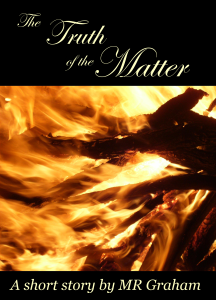M.R. Graham's Blog, page 27
October 20, 2012
Getting sidetracked…
I hate when you’re between projects, and you know what you’re supposed to be doing next, but there’s another idea that just seems so much better and more fun.
The Wailing will be coming out Halloween. It’s the first of my Books of Lost Knowledge series. That is to say, it’s the first one out; they’re not in chronological order, and it’s not necessary to read them in any particular order. My plan is to release In the Shadow of the Mountains around Christmas or early next year, which will make it the second Book of Lost Knowledge. It’s already complete and just needs to be tweaked in terms of formatting.
Now, as I’m formatting Shadow, I was supposed to be finishing up The Lions’ Den, which features one of the same characters from both Wailing and Shadow. I wanted people to really get to know Daniel (the character) before I started building up characters who are only tangentially related to him. The thing about Lost Knowledge is that the stories are a series pretty much only by virtue of taking place in the same ‘verse. As I said, they’re not chronological. Some of the main characters have met each other briefly – the main protagonists from Lions’ Den, The Sparrow’s Fall, and The Third Day all come together in Shadow, though two of them are presented only superficially, and one is thoroughly misrepresented. (Lol, spoilers.)
The problem is Kim.
Kim shows up in The Sparrow’s Fall, but like all of my secondary characters, she is starting to take on quite a life of her own. She’s also starting to haunt my dreams and demand that I give her at least one book of her own. I don’t really mind that, since there is a stark dearth in my writing of strong female protagonists, not so much as a result of sexism as, well… I’ve never found it easy to relate to my fellow females.
I can relate to Kim. She’s a Texan, a native San Antonian (as seems to be increasingly more common with my characters as I really get involved in Texan culture and the fantastic Hispanic strains that can be incorporated into urban fantasy. I mean, curanderismo is pretty awesome, and it’s got amazing visual aspects that can be brought into a system of fictional magic.) and a wizardlet. She’s also got her own badass posse of an immortal gunslinger and a fake Apache shaman. She keeps reminding me that she had a buttload of adventures and fun and angst before she ever passed through Austin, which is where Sparrow’s Fall finds her.
And now poor Daniel has been shoved aside, and I’m doodling Kim in the margins of notebooks, in all her punky ’90s glory.
Guess I’ll have to add another subcategory for wizards in my Lost Knowledge series.
How do professionals stay on track? This is really annoying.


October 7, 2012
The Living Past
 2 October, 1835, the Texas Revolution began at Gonzales, Texas. Several years earlier, the Mexican government had granted the town a cannon for protection against the Comanche raids that were common in that region. In 1835, however, after a revolt orchestrated by several other Mexican states, Colonel Domingo de Ugartechea, commander of Mexico’s military forces in Texas, set about disarming the colonists, despite a solemn pledge of allegiance from Gonzales to President Antonio Lopez de Santa Anna.
2 October, 1835, the Texas Revolution began at Gonzales, Texas. Several years earlier, the Mexican government had granted the town a cannon for protection against the Comanche raids that were common in that region. In 1835, however, after a revolt orchestrated by several other Mexican states, Colonel Domingo de Ugartechea, commander of Mexico’s military forces in Texas, set about disarming the colonists, despite a solemn pledge of allegiance from Gonzales to President Antonio Lopez de Santa Anna.
The citizens of Gonzales already had reason for discomfort. A few weeks earlier, a Mexican soldier had beaten a Gonzales man, and after a loud public outcry, the people of Gonzales feared that the confiscation of the cannon was nothing but a prelude to harsh measures against their protests. They refused to surrender the cannon to the men Ugartechea sent.
On 29 September, one hundred men under Francisco de Castaneda, arrived in Gonzales to take the cannon by force. The people of Gonzales stalled for several days while sending out messengers to nearby towns, calling for reinforcements. By 1 October, more than 140 armed Texians had assembled in Gonzales, and in the morning of 2 October, they arrayed themselves along the banks of the Rio Guadalupe and opened fire on Castaneda and his dragoons, under a homemade banner that proclaimed “COME AND TAKE IT.” With no cannonballs available, they loaded the cannon with scrap metal and nails.
The Mexicans, startled and outnumbered, retreated. Texas was on its way to independence.
 Today, Come And Take It Weekend is hosted in Gonzales, where reenactors play out the historic battle of the Lexington of Texas. Under the Six Flags of Texas, the cannon still stands within the Gonzales Memorial Museum. They never did come and take it.
Today, Come And Take It Weekend is hosted in Gonzales, where reenactors play out the historic battle of the Lexington of Texas. Under the Six Flags of Texas, the cannon still stands within the Gonzales Memorial Museum. They never did come and take it.
A hundred and seventy-seven years later, surprisingly few people, even here in Texas, know the story of the cannon of Gonzales. Texas history is not as popular as the World Wars, the Norman invasion of Britain, the Russian Revolution, or even pre-Revolution American history, even though Texas has been her own nation in the past, and could probably survive again as an independent republic, though of course not with nearly as much success as she enjoys as part of the United States. I am enormously grateful to the men and women of Gonzales who put so much effort into making the Texas Revolution visible and vital. It remains a part of our culture here, deeply ingrained in the Texan sense of dignity and duty.
I will do my best to do my part to keep that history alive. Maybe someday, I’ll write a book about it.


September 30, 2012
Review – The Sin Collector (Jessica Fortunato)
The Premise:
Liliana, Sin Collector, an immortal and invulnerable creature who seems to have made Last Rites into a supernatural power, is suddenly confronted with a creepy clan of angry humans who have figured out how to kill Liliana’s kind – the Castus. What started as a fun globe-hopping adventure with a cute guy she knew from childhood turns into a miasma of Sin Collector politics, a love triangle, and the Castus trying to kill everyone.
The Good:
I had never heard of a paranormal story with quite this brand of creature before. I love the idea of the Sin Collectors and what they do. In short, the Sin Collectors are born to perform what is essentially the Last Rites for the dying. They draw out the sins of the subject and take those sins upon themselves, allowing the subject to pass unburdened into the next life. It’s a fascinating mythos, and I wish it had been explored further.
The villains were pretty spiffy, as well. Seeing themselves as a holy order, the Castus are outraged that Collectors would dare absorb the sins of the truly evil and allow genuinely bad people a chance at salvation. Honestly, I can see that happening. Just look at some of the religious conflicts that go on in the world today. They all pretty much boil down to “We’re good people, and you’re not, and you’re only worse because you claim you’re good people, too.” Underneath the magic and the sorcery, the hatred of the Castus is very true.
The work is too short to allow for really deep character development, but I liked most of the characters and could feel a strongly-developed backstory even for minor characters. The world is well-fleshed out, and so are most of its inhabitants. Honestly, one of my favourites only barely got any screen time. I would have loved to see more of the mysterious Rebecca, a Collector so old she is actually beginning to show her age.
Liliana’s character also starts out very strong. She is exasperated with her life, tired of her job, deprived of a real purpose by modernity’s rejection of the supernatural, and she adds a lovely dose of snark and humour to her narration. Unfortunately, that leads me to
The Bad:
For a hundred-and-twenty-something immortal who has seen far more than her fair share of death, suffering, and evil, Liliana comes into her whole ordeal with a startlingly juvenile mindset. She has a tendency to storm off in a fit and slam doors when she gets upset. I had thought for a while that she might be psychologically frozen at twenty years, when some people do still act like that, but other Collectors were shown as wise and hyper-mature as a result of their age and experience. I would have liked to see more of that in Liliana.
***BEGIN SPOILERS***
While Liliana is portrayed as being very smart and worldly, some of her actions do not reflect that. For instance, when her childhood friend William, another Collector, reappears more after more than a hundred years of no contact, she leaves behind the entire life she has built and goes to Ireland with him. While I can understand her boredom and thirst for adventure, the impression I got is that she is willing to leave everything she has worked for primarily because William is hot.
When she begins to suspect William of being traitorous and possibly homicidal, she pushes her suspicions under the rug and has frantic end-of-the-world sex with him. The line is actually “LiLi this could be our last night on earth. Don’t you think we should enjoy it?” There is no mention of her regretting this decision when her suspicions are proven right. It really felt more like an excuse to insert sex, however tastefully described, than an attempt to move the plot forward.
And then, once the traitorous William has been disposed of, Liliana falls in love with her father-figure. Granted, this father figure is physically stuck at twenty years old, like all Collectors, and granted, Liliana has not seen him for some time; however, he is still more than four hundred years older than she is, and he raised her from a small child, and he did kidnap her in order to perform a magical ritual on her against her will.
In some ways, the hostility between William and Olexander (the father-figure) reminds me of the Edward-Jacob dynamic in Twilight, not least because the hostility apparently stems entirely from the two of them fighting over the girl.
***END SPOILERS***
Finally, the book could use a good copyedit. Nearly all of the dialogue is incorrectly capitalised and punctuated. Where there should be a comma and a lowercase, there is nearly always a period and a capital letter, and vice versa. Since the capitalisation and punctuation are consistent, I am more inclined to think that they are not merely typos. I am a strong proponent of using sentence fragments for emphasis, but in The Sin Collector, their frequency is distracting, and in several places, a sentence changes directions in mid-thought or is missing a necessary word.
In Conclusion:
I enjoyed the story. I found it well-paced and highly original, though I felt that the love triangle eventually overshadowed the element of suspense and danger that I liked so much. I hesitate to call Liliana a strong female lead, but as this is the first book in a trilogy, I feel she could easily evolve into a powerful woman. Anyone without my grammar-nazi tendencies could probably get past the syntax issues.
The Sin Collector was not exactly my cup of tea, but I will probably be looking for the next book in the series when it comes out in 2013, and I can see this developing a massive following.


September 27, 2012
The Truth of the Matter – Paperback!
September 26, 2012
Faith, Beating the Bad Guys, and Hope in Fiction
Proposition: All stories are, to some extent, allegory.
Yes, writers often write to entertain, to divert people from mundane life, to get the stories out of their heads. Often, it is no more than that. As someone who was writing stories since I could hold a pen and telling them before that, I always hated English teachers who read all kinds of ridiculous symbolism into books. Take The Yellow Wallpaper, for example. We all know that the wallpaper itself translates into both bars and eyes, the bed nailed to the floor is marital slavery, etc. But what does the pen represent? What pen? Why, the pen with which the narrator writes her recollection! The pen that is never actually mentioned in the story! It’s the most important symbol of all! In the end, I made up some BS about the pen representing the narrator’s bid for intellectual freedom and made an outstanding grade on the essay, but it was nothing but BS, and I digress.
Every story contains a parallel to life, a thread of exploration of the human condition. That’s what makes a story worth reading. If the story gets too trippy and too far off base, it ceases to be engaging, and the reader puts it down. Stories tell us things we already knew, reinforce our beliefs about ourselves, and challenge our thinking. They elevate us.
That’s why I can’t stand over-powered bad guys. For me, they’re as off-putting as over-powered protagonists.
That’s not to say that I see happy endings as a requirement for good fiction. Quite the opposite, in fact. I sort of like vaguely dissatisfying endings that tie off all the loose ends in a way I never expected and am really not sure I wanted. Happy endings are well and good in their place, but we’ve all sort of become inured to the feelings they produce. I would rather cry at the end, because that means that I feel more. I would rather throw the book across the room and curse at the author and write my own ending, then tear it up, because even though the ending was horrible, it was also right.
No, I don’t insist on happy endings. I do insist on the possibility of a happy ending. Even if I know from the start that this can’t possibly end well, I want to be able to hope right until the last page.
Unbeatable villains kill that possibility.
I bash on Twilight a lot, and I’m going to go at it again. Twipires fall under this category. I’m not talking about “bad villains” in the sense of being ridiculous, because they’re not. Leaving aside the sparkling, Twipires are terrifying. They can move faster than the human eye can follow. They can throw cars and uproot trees and literally crush a human body to pulp. You can’t punch them or stab them or shoot them. You can’t fend them off with a cross or holy water or any of the standards. If one goes for you, you have to hope it kills you quickly, because if it doesn’t, you’ll spend your last minutes in unimaginably excruciating pain, thanks to the crazy venom these guys secrete. If that wasn’t enough, they tend to develop bizarre EXTRA powers, most of which can be weaponised. And to top it off, they’re irresistibly attractive, drawing in victims like a sparkly, rock-hard venus flytrap.
There is no way to defeat a Twipire, much less destroy one. At least, if you’re human.
And that, right there, is what killed Twilight for me, plot-wise. There is no way a human could possibly be the hero in Twilight. The only creatures capable of defeating the bad guys are other Twipires, and Meyer spends a lot of time making sure that the reader cannot identify with the Cullen family. They’re perfect, inhuman, aloof, distant, unrelatable. They are beyond human. Even when Bella is transformed, a lot of description is dedicated to her forgetting what it was like to be human, because her new experience is so completely detached from her previous existence.
Even the wolves, who are more human than the Twipires, have their crazy temper problems and their hive mind and their immortality, super strength, and all that other good stuff that makes them… not human.
Meyer created a villain that logically, even in her own ‘verse, should have taken over completely and wiped out human civilisation.
It is not necessary for a bad guy to be unbeatable. I can list off any number of bad guys who are pants-soiling scary without trespassing on this Scary Sue territory. Dracula comes to mind, to contrast with the Twipires. Dude can control weather, turn into a wolf or a bat, turn into mist and sneak into people’s houses, hypnotise people, turn meek Victorian women into raging undead infanticidal nymphomaniacs… And he was defeatable. Sauron, Voldemort, Max Brooks’s zombies, Moriarty, the Joker, the Borg, the xenomorphs…
And you notice, not all of those were defeated. The important thing is that they could be defeated. Pretty much all of the Batman villains are constantly breaking out of prison and wreaking more havoc. They can’t be permanently contained. In World War Z, the zombie plague wipes out most of mankind, and it’s entirely likely that North Korea is still full of them. The xenomorphs just keep killing everyone.
But in every case, it’s possible to get rid of the bad guy. It’s possible to win. If the protagonist fails, it’s because of human shortcomings and not because of inhuman indestructibility.
Here’s why:
Human beings thrive on hypothetical scenarios. Our favourite interview questions begin with the word “if.” If you won the lottery, if you could have one wish, if you could visit any place, if you only had one more day to live. We spend a lot of time preparing for things that will never happen. Young people buy life insurance early even though they probably won’t die for another fifty years or more.
There is a whole nerd subculture that has already prepared for the unlikely-but-remotely-possible event of a real zombie apocalypse. Canned food, bottled water, machetes, shotguns, flamethrowers, sealed packages of seeds, stockpiles of gasoline.
That’s because, in the unlikely-but-remotely-possible event of a zombie apocalypse, there is also a possibility of survival. The monsters are horrifying, but they can be beaten. There is a reason to try.
Living through a situation vicariously through a book is similar, for those of us who prefer our zombies on paper. We expend our time and energy on reading because there is a possibility of following the protagonist through into victory. If the protagonist cannot win, there is no point. (Mind, not if it looks like the protagonist can’t win, but if the protagonist actually, really, truly cannot win.) Why invest emotionally in a character only to watch him fail? Or (possibly worse) only to watch somebody else swoop in and save the day? It’s an investment with no return. I can’t have fun or find distraction by putting myself in that character’s shoes.
We as humans do not like to imagine that there is absolutely nothing we can do to save ourselves. Even if the protagonist is not human, it is nearly always a human-surrogate, be it an anthropomorphic Disney animal or a sentient AI. There is something human, connectable, in every engaging protagonist, and that is what the reader latches on to as an anchor to carry her through the story.
And somewhere in the mix, there must be hope. The reader can lapse into despair when all hope seems lost, and it falls to the character to pull through. When the character despairs, we as readers can keep hoping in his stead, because even if the bad guy wins, it’s not because the bad guy had to win. It’s because something went wrong somewhere. Tragic endings are real. They’re life-like.
Resemblance to reality must end with despair. A story without hope, without any hope, either from reader or character, is a a black hole in a world where hope has fallen out of fashion. Cynicism in fantasy is unforgivable.


September 23, 2012
Real Vampires Get Knocked Down, but They Get Up Again (You're Never Gonna Keep Them Down)
 Reblogged from The Great and Terrible Lamm:
Reblogged from The Great and Terrible Lamm:


I’ve been thinking a lot about vampires. This may have something to do with the fact that I’m watching the first three seasons of Buffy the Vampire Slayer (I’d only ever seen from season four on), or it may be that I’m feeling the temporary loss of True Blood (it’s gotten to be a kind of family tradition ’round here). Whatever the reason, I’ve realized something has been bothering me about modern vampires.
Yes, I think this pretty much sums up my feelings. I'm all for the death-by-impalement - it's reciprocal penetration, destroying the penetrator by turning its own symbolism against it and thus denying its power both sexual and lethal - but... scary vampires are better. I mean, walking allegory, hello. What's worse than looking into the face of a corpse and seeing your own fate reflected there?
A World of Dreams
Everybody wants things. I don’t think there’s anything wrong with that.
Me, I want to live someplace that actually has four different seasons. One of the sayings about Texas is that we have Almost Summer, Summer, Still Summer, and Christmas. Down in the Rio Grande Valley, we have Hell, Gehenna, Inferno, and Damnit, I’m Wearing A Sweater Even Though I Turn Purple and Pass Out From Heat Stroke.
I want snow. I want leaves that change colours.
I desperately want to do well enough with my books that I can, y’know, move somewhere with seasons. And travel. Maybe not right now, but someday, when I turn into the awesome old lady I’m going to be. I want to see Jerusalem and Warsaw and Machu Picchu. And everything else, actually.
I want to fix things, make a difference, not be forgotten. If I could save a life, feed a child, teach a woman to read… Yes.
I want to be more than I am.
I suppose that the problem is that I spend more time dreaming than doing. I think that’s everyone’s problem. I mean, I’m not into that Disney “dreams come true” stuff, but you’re a lot more likely to get there if you work for it. Culmination of a lifetime of bad habits: I go nowhere. Wanting isn’t enough.
I’m not really sure what’s up with that post. Here, have some sunflowers.


September 16, 2012
Beach Day in Photos
Yesterday was a beach day. I had things to do, and they had to be done by Monday (and they still have to be done by Monday), but every now and again, you just have to go to the beach. Salt air and a strong breeze can blow away all kinds of stress. At the beach, no one finds you sitting perfectly still, staring into nothing, and feels the need to interrupt.
This guy greeted us:
 I believe that he is a great blue heron. He lives around there, and after deciding that we weren’t going to eat him, he came over to see whether we might feed him instead. He pooped on a few things and the left.
I believe that he is a great blue heron. He lives around there, and after deciding that we weren’t going to eat him, he came over to see whether we might feed him instead. He pooped on a few things and the left.
It was an amazing day. I’ve rarely seen the water so blue on a Texas beach:
 I should point out that this is not a bad thing. Rain at the beach keeps it from becoming ungodly hot in the afternoon, keeps the sand from becoming so soft your car gets stuck in it, and washes away the salt that collects on everything and makes it all sticky. Beach rain is one of my favourite kinds of rain, and rainy days are some of my favourite beach days.
I should point out that this is not a bad thing. Rain at the beach keeps it from becoming ungodly hot in the afternoon, keeps the sand from becoming so soft your car gets stuck in it, and washes away the salt that collects on everything and makes it all sticky. Beach rain is one of my favourite kinds of rain, and rainy days are some of my favourite beach days.
And it rained.
 And then it stopped raining, and the sun came out, and the beach was clean.
And then it stopped raining, and the sun came out, and the beach was clean.
 And the beach was clean, and the Island was clean, and I was clean. Beach days are a restorative of the soul.
And the beach was clean, and the Island was clean, and I was clean. Beach days are a restorative of the soul.


September 13, 2012
The “Look” Challenge – The Wailing
Sorry for two in one day, but I’ve been tagged by the remarkable Peter Dawes!
Take your current manuscript and find the first instance of the word “look”. Then post the surrounding paragraphs as an excerpt of the book on your blog. Lastly, tag five more blogging authors who you think would be a good choice for the game.
Unfortunately, the first instance of “look” was taken by the intro I already posted, so I had to find the next one.
The Wailing: Excerpt
That pattern was not apparent to me, but the truth of the assignment lay plainly between the lines. Threat or no, breach or no, she frightened them. They kept tame murderers on a leash, domesticated killers like myself, but they became nervous at finding one in its natural habitat. This Signe was a wolf, and I, their hound.
The first of the photographs showed me a woman in her prime with a dark, determined air about her. Beneath a fashionable hat, her black hair was drawn back in an elaborate twist. A sharp, severe profile stared out across the bustle of Charing Cross Station. She certainly looked formidable. She was even lovely in an aloof, vulpine way. I would have to kill her.
At her side was a little girl, her face turned away from the camera. She was thin and hatless, her hair the shade and texture of dirty straw. She appeared at first to be seven or eight years old, but the rest of the photographs showed me a girl of about fifteen, much too small and skinny for her age, her eyes sunken and afraid. She might have been pretty, had she not been so plainly ill. Some sort of cripple, perhaps. A pet, an easy target scraped up from the gutter and kept on a short lead until her inevitable demise.
The photographs were dated more than a month earlier; it seemed impossible to me that the girl might still be alive, but I resolved to look for her all the same. Once her captor was slain, a better home might be found, a place where the scars could begin to heal.
Nowhere in the bundle of eclectic information was any clue as to where I might find my target. She had been in London on the day the photographs were taken, but the text made much of the extent of her travels. I had no way of knowing whether she had stayed, and even if she had, London is vast.
At half past three, I crumpled the entire dossier, save for one photograph, and stacked the wads of papers in the grate, setting the whole thing alight. When the sheets had been reduced to brittle, black carbon, I crushed them into ash. The clack of Rowan’s typewriter had ceased some hours before, and the house was quiet, save for the creaks and groans of old walls. It was a lonely feeling, listening to the early morning. Outside, homes were burning and the dead were being stacked in the streets like charred sardines. Inside, I prepared to carry out an unpleasant duty.
At last I realized that I was sitting fully clothed in overcoat, hat, and gloves, with a pistol at the small of my back, secure in my own quarters at half past three in the morning. Absurdity and exhaustion assaulted me at once, along with the knowledge that I would be of no use to anyone if I ran myself into the ground. Life would be hard until I brought Signe down, hard enough without sleep deprivation compounding the difficulty.
I stripped and fell into bed to steal the last few hours before the sun rose.
Tags!


The spiders gear up for Halloween.
Okay. Okay, seriously. I walk into the bathroom for my morning ablutions, look up, and find this:
Can you see it? Can you see the candy-floss thin strands of cobweb? I swear they did this overnight. The most amazing part is that these cobwebs stretched from the light fixture to the plant on the counter to the door to the other door to the wall behind me. It was as though they were constructing spider highways across the whole of the bathroom.
I was seriously tempted to leave it there through the rest of the month and up to Halloween. You know, encourage them to expand their efforts through the rest of the house. I mean, nothing looks more like cobwebs than cobwebs.
But in the end, I decided it was a bit too unsanitary and Swiffered them down. Sad, but necessary.
I just felt the need to share.



















